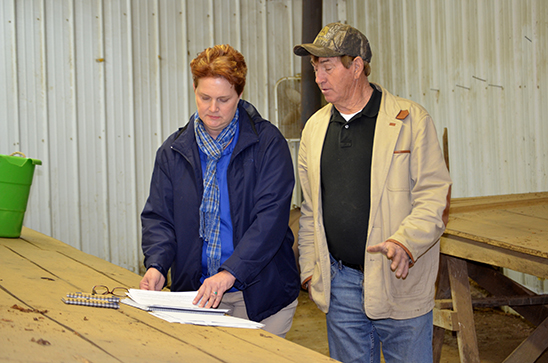Extension, growers work together in Tobacco GAP Program
Extension, growers work together in Tobacco GAP Program

Visiting farms and checking greenhouses is all in a spring day’s work for Carol Hinton, Breckinridge County extension agent. It’s these visits and her attention to detail that help farmers in this agriculture-dependent county continue to grow tobacco.
Hinton is one of several Kentucky agriculture and natural resources extension agents who work with their growers to make sure they are compliant with the U.S. Tobacco Good Agricultural Practices Program. Without their compliance and participation in an annual training, growers cannot sell their tobacco.
“GAP training is a way for the farmers to keep all of their records in one place, so they are accountable to the people buying their tobacco,” said Hinton, who works for the University of Kentucky Cooperative Extension Service. “They realize how important keeping good records is if they’ve ever gone through a pesticide audit with the state.”
The GAP Program began about four years ago through collaboration between the tobacco industry, universities including UK, state departments of agriculture, grower associations, tobacco manufacturer dealers and other farm organizations. The goal was to create a unified set of standards that were sustainable, economically viable, ensured the rights of farm workers and resulted in a product produced with consideration to the environment.
“Most Kentucky growers use good practices anyway, so a lot of what GAP comes down to for them is keeping good records on what they’re doing,” said Bob Pearce, UK tobacco extension specialist with the College of Agriculture, Food and Environment.
Eddie Dyer, a lifelong Breckinridge County farmer, agreed that was true for him.
“We had the information in our pickup trucks and in different notebooks and different places, and GAP came up with one notebook,” he said. “It takes time to keep the records straight, but at the end of the year you can look back and find it easier.”
In addition to keeping good records, farmers must attend an annual GAP training. County extension agents work with Pearce and Andy Bailey, UK dark tobacco extension specialist, to schedule and conduct those programs. The programs are offered at a variety of times and locations as well as online.
“As extension specialists, it has given us an opportunity to meet with growers on a yearly basis,” Pearce said. “Not only do we see them during these sessions, but if they have an issue that comes up later, they know the face, and they feel more comfortable calling their agent or calling me to come investigate a problem and help them in those real-world situations.”
Around 125 producers from several Kentucky counties as well as Indiana attend one of the annual GAP trainings offered in Breckinridge County. Hinton offers an additional safety training to farm laborers in Spanish each year. Topics range from heat stress to green tobacco sickness to safety measures in the field.
“Worker training is a big issue with the tobacco companies. Carol Hinton has a training for them in the fall, and that saves us a lot of time,” said Charlie Henning, Breckinridge County farmer.
No program is without faults. Much of the same information is presented in the trainings every year and keeping good records can be time consuming, but Pearce sees the program as an opportunity to ensure the quality of U.S. tobacco.
“We can say this tobacco was produced using a certain set of standards and that has positive implications in the world market,” he said.
Crops Extension


